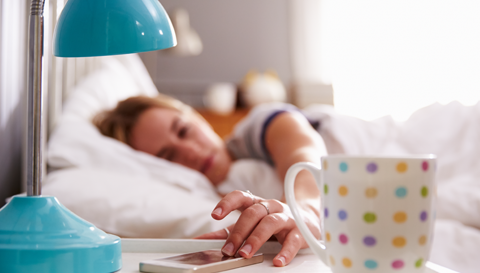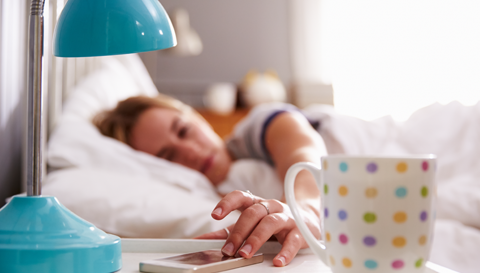
We spend nearly a third of our lives asleep, but most of us don’t know why sleep is so important to our well-being. Much more than just an intermission from the stressors of our busy, waking lives, good sleep is crucial for our overall physical, emotional, and mental health.
Researchers are discovering that the duration and quality of our sleep affect everything from our cognitive performance, mood, and memory to the health of our immune and endocrine systems. In fact, drowsiness is so prevalent (50 million Americans report not getting enough shuteye) that hundreds of thousands of crashes, injuries, and accidents each year are attributed to a lack of sleep.
Quality sleep can improve your memory, reduce temporary inflammation, sharpen your focus, control your weight, and lower your stress levels. So, how does your body know when and how much to sleep?
Our Circadian Rhythms
Contrary to the feeling that we are “shutting down” for the night when we go to bed, sleep is a very active physiological process. Indeed, we usually pass through all five stages of sleep four to six times every night! From healing and repairing the heart and blood vessels to balancing hormones and supporting growth and development, sleep is a critical time of restoration and renewal.
When we sleep is largely dictated by our body’s circadian rhythms (fluctuating body temperature and hormone levels, for example) regulated by our internal biological clock over a 24-hour period. Our clock determines when we feel tired and when we feel awake, and external factors like light and darkness in the environment and our work and social schedules help to “set” the clock.
Any disruption to the circadian system, like pulling an all-nighter or flying across the country through different time zones, can result in a confused inner clock and exhaustion. Poor memory, low-quality sleep, irritability, slower reflexes, and impaired motor control are often soon to follow.
Although external cues play a big part in telling your inner clock when it’s time to slumber, your microbiome plays a surprising role as well.
Gut Health and Sleep
The microbiome is the collective trillions of microbes living in your body and on your skin. When in balance, this vast ecosystem of bacteria works in harmony with your body’s cells to support virtually every bodily function, including your immune system, digestion, nutrient absorption, and metabolism.
Most of the bacteria in your body reside in your gut, but they can communicate with your brain via the gut-brain axis. Some beneficial microbes—termed psychobiotics—even help support your memory, emotions, cognitive function, and mental state.
We know that bacteria can talk to our brain—is it possible then, that a good night’s sleep begins in the gut? The answer is yes, according to new research.
Bacteria in the gut can produce and regulate a number of neurotransmitters and hormones that impact our sleep:
Tryptophan and Melatonin: In a recent study, a type of Bifidobacteria was found to increase blood levels of tryptophan, an amino acid that converts into serotonin and then into melatonin, the hormone that regulates how sleepy you feel.1
Serotonin: Dubbed the “happy” chemical, serotonin helps to regulate mood and plays a significant role in sleep quality. Researchers found that serotonin deficiency in rats led to disrupted circadian rhythms and sleep-wake cycles (aka restless sleep).2 The vast majority of serotonin in the body (over 90%) is manufactured in the gut, and gut microbes help to regulate the amount produced.3
GABA: Scientists found that some Lactobacillus bacteria help to produce GABA, the calming brain chemical, as well as enhance its brain receptors.4
Cortisol: Research has even demonstrated that certain types of friendly flora can help lower levels of cortisol, a hormone that becomes elevated during times of stress.5
Gut microbes also have their own daily rhythms that influence our circadian rhythms, affecting our metabolism and how we sleep. In one study, mice fed a typical Western high-fat, high-sugar diet that depleted beneficial bacteria showed circadian rhythm disruptions that led to a host of other problems, like issues with weight management.6
Healthy Sleep Hygiene
If you find yourself spending more time counting sheep than recounting your dreams, take these steps to create a supportive sleep environment.
- Stick to a schedule. Keeping your bedtime and wake up time the same every day (yes, even on the weekends) helps to set your internal clock.
- Relax before bed. Using progressive relaxation or meditation techniques right before bed can calm your mind and set the stage for a peaceful night’s sleep. Also, limit your exposure to blue light from screens, electronic devices, and fluorescent lightbulbs for a couple of hours before bedtime. Studies show that blue light suppresses melatonin and changes circadian rhythms.7
- Set the scene. Make sure your bedroom is conducive to sound sleep by keeping it cool (between 60 and 67 degrees), dark, and free from distracting noises. Ear plugs, fans, eye masks, and white noise machines can help.
- Try grounding. Grounding, also called earthing, is the process of connecting your body to the earth by walking barefoot or sitting/lying directly on the ground. You see, the negative grounding charge of the earth balances out free radical positive electrons that can build up in our bodies from our modern lifestyles, disrupting our natural rhythms. One research study showed reduced nighttime cortisol levels and normalization of circadian rhythms in subjects who slept on a grounding mattress pad.8 Aim for daily barefoot time outdoors or look for a grounding pad or sheet for your bed.
- Take a daily probiotic. So many factors in our daily lives—like diet, stress, antibiotics in food and as medicine, antibacterial cleaners, and certain medications—deplete the good bacteria in our gut that can produce important neurotransmitters and help maintain our circadian system. PRO-15 is a multi-strain probiotic formula that delivers 15 billion CFU deep into your gut to support overall health and help keep your body functioning at its best.
The truth is that everyone has a night of poor sleep now and then. Whether you have trouble turning “off” your brain the night before a big meeting or are tending to a child who is under the weather, a temporary lack of sleep can make you feel out of sorts. Setting yourself up for long-term sleep success will help you weather these temporary bouts of sleeplessness and put you well on the way toward feeling vibrantly healthy for all your waking hours.
References:1. Desbonnet, L., Garrett, L., Clarke, G., Bienenstock, J., & Dinan, T. G. (2008). The probiotic Bifidobacteria infantis: An assessment of potential antidepressant properties in the rat. Journal of Psychiatric Research, 43(2), 164-174.
2. Nakamaru-Ogiso, E., Miyamoto, H., Hamada, K., Tsukada, K., & Takai, K. (2012). Novel biochemical manipulation of brain serotonin reveals a role of serotonin in the circadian rhythm of sleep-wake cycles. European Journal of Neuroscience, 35(11), 1762-1770.
3. Yano, J., Yu, K., Donaldson, G., Shastri, G., Ann, P., Ma, L., . . . Hsiao, E. (2015). Indigenous Bacteria from the Gut Microbiota Regulate Host Serotonin Biosynthesis. Cell, 163(1), 258.
4. Bravo, J. A., Forsythe, P., Chew, M. V., Escaravage, E., Savignac, H. M., Dinan, T. G., . . . Cryan, J. F. (2011). Ingestion of Lactobacillus strain regulates emotional behavior and central GABA receptor expression in a mouse via the vagus nerve. Proceedings of the National Academy of Sciences, 108(38), 16050-16055.
5. Kato-Kataoka, A., Nishida, K., Takada, M., Suda, K., Kawai, M., Shimizu, K., . . . Rokutan, K. (2016). Fermented milk containing Lactobacillus casei strain Shirota prevents the onset of physical symptoms in medical students under academic examination stress. Beneficial Microbes, 7(2), 153-156.
6. Leone, V., Gibbons, S., Martinez, K., Hutchison, A., Huang, E., Cham, C., . . . Chang, E. (2015). Effects of Diurnal Variation of Gut Microbes and High-Fat Feeding on Host Circadian Clock Function and Metabolism. Cell Host & Microbe, 17(5), 681-689.
7. Lockley, S. W., Brainard, G. C., & Czeisler, C. A. (2003). High Sensitivity of the Human Circadian Melatonin Rhythm to Resetting by Short Wavelength Light. The Journal of Clinical Endocrinology & Metabolism, 88(9), 4502-4502.
8. Ghaly, M., Teplitz, D. (2004). The Biologic Effects of Grounding the Human Body During Sleep as Measured by Cortisol Levels and Subjective Reporting of Sleep, Pain, and Stress. The Journal of Alternative and Complementary Medicine, 10(5), 767-776.
___________________________________________________________________________________________
Emily Courtney is a Writer and Editor at Hyperbiotics and mom to two fun and active boys. Emily is passionate about natural wellness and helping others learn about the power of probiotics for vibrant health! For more ideas on how you can benefit from the power of probiotics and live healthier days, be sure to subscribe to our newsletter.

